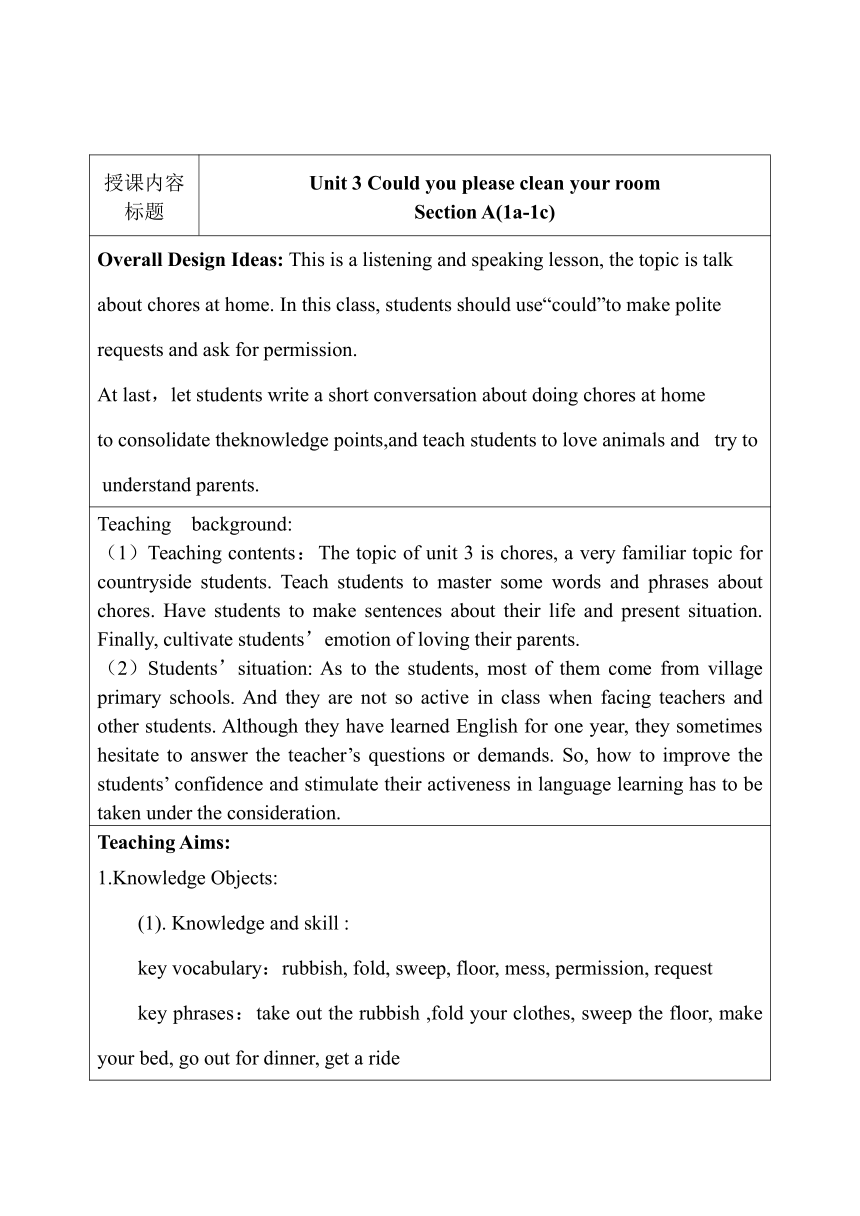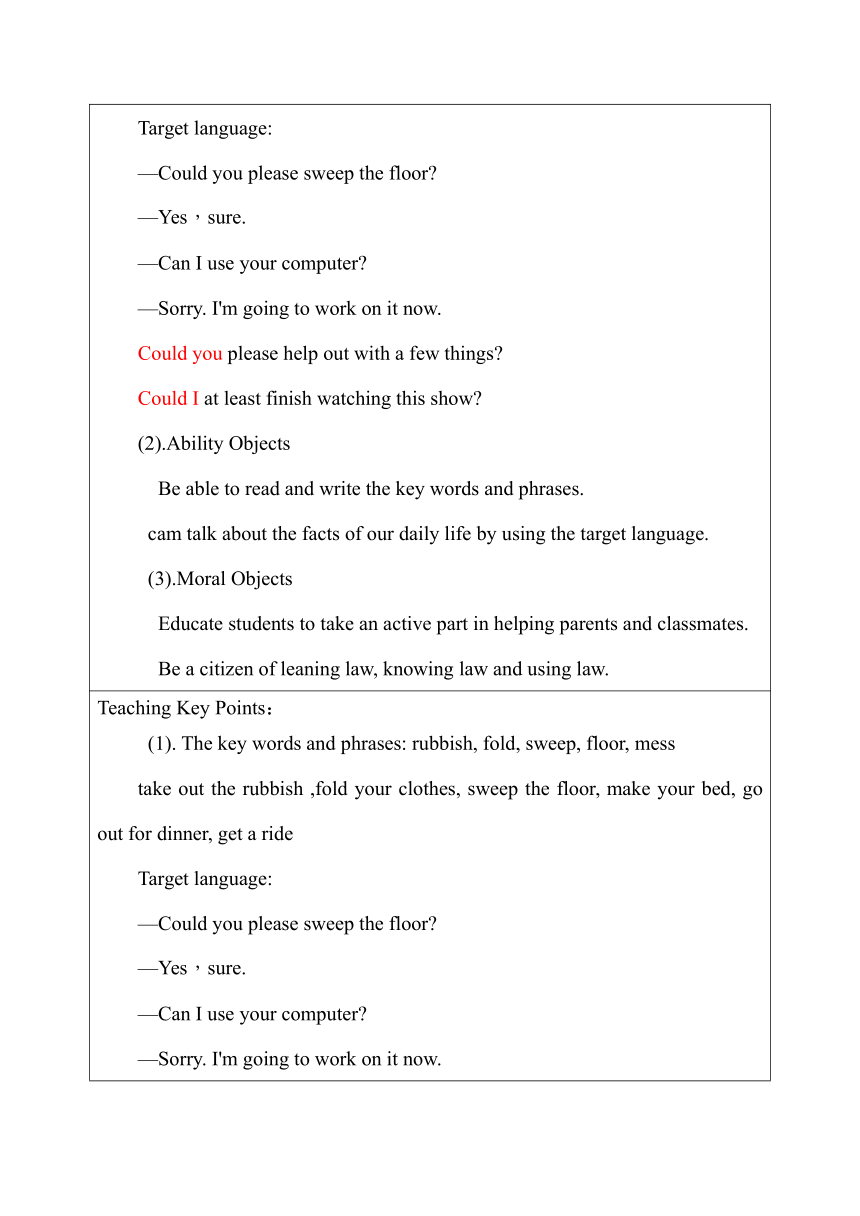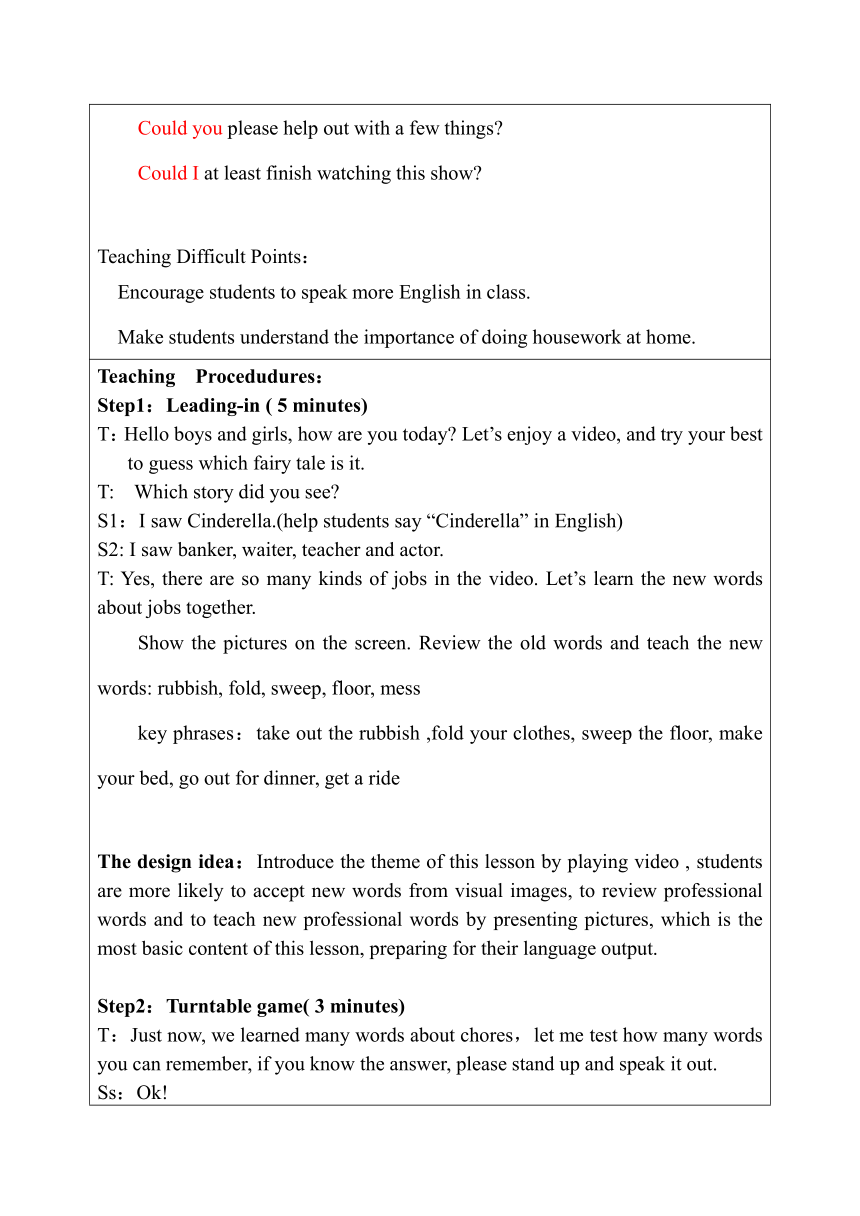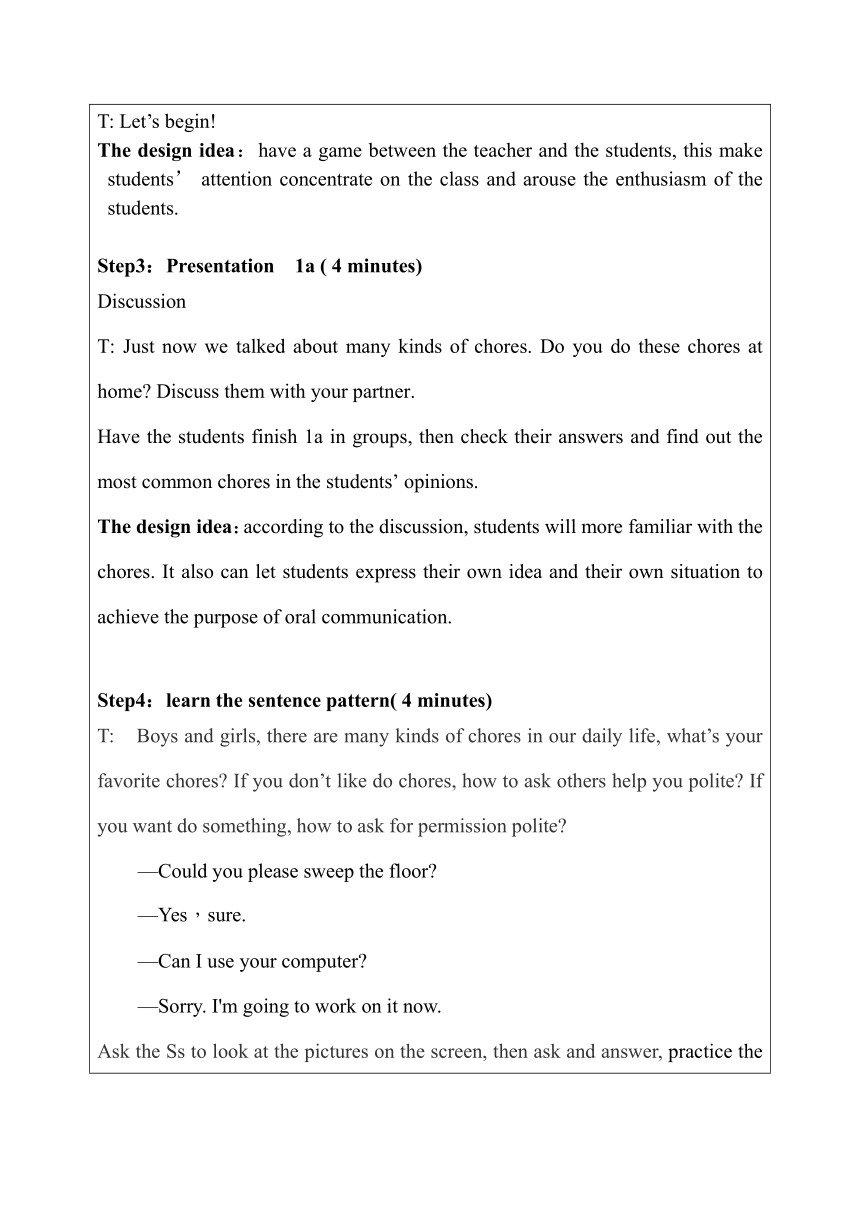Unit3 Could you please please your room.Section A(1a-1c)教案
文档属性
| 名称 | Unit3 Could you please please your room.Section A(1a-1c)教案 |

|
|
| 格式 | docx | ||
| 文件大小 | 28.8KB | ||
| 资源类型 | 教案 | ||
| 版本资源 | 人教新目标(Go for it)版 | ||
| 科目 | 英语 | ||
| 更新时间 | 2022-03-23 00:00:00 | ||
图片预览




文档简介
授课内容 标题 Unit 3 Could you please clean your room Section A(1a-1c)
Overall Design Ideas: This is a listening and speaking lesson, the topic is talk about chores at home. In this class, students should use“could”to make polite requests and ask for permission. At last,let students write a short conversation about doing chores at home to consolidate theknowledge points,and teach students to love animals and try to understand parents.
Teaching background: Teaching contents:The topic of unit 3 is chores, a very familiar topic for countryside students. Teach students to master some words and phrases about chores. Have students to make sentences about their life and present situation. Finally, cultivate students’emotion of loving their parents. Students’situation: As to the students, most of them come from village primary schools. And they are not so active in class when facing teachers and other students. Although they have learned English for one year, they sometimes hesitate to answer the teacher’s questions or demands. So, how to improve the students’ confidence and stimulate their activeness in language learning has to be taken under the consideration.
Teaching Aims: 1.Knowledge Objects: (1). Knowledge and skill : key vocabulary:rubbish, fold, sweep, floor, mess, permission, request key phrases:take out the rubbish ,fold your clothes, sweep the floor, make your bed, go out for dinner, get a ride Target language: —Could you please sweep the floor —Yes,sure. —Can I use your computer —Sorry. I'm going to work on it now. Could you please help out with a few things Could I at least finish watching this show (2).Ability Objects Be able to read and write the key words and phrases. cam talk about the facts of our daily life by using the target language. (3).Moral Objects Educate students to take an active part in helping parents and classmates. Be a citizen of leaning law, knowing law and using law.
Teaching Key Points: (1). The key words and phrases: rubbish, fold, sweep, floor, mess take out the rubbish ,fold your clothes, sweep the floor, make your bed, go out for dinner, get a ride Target language: —Could you please sweep the floor —Yes,sure. —Can I use your computer —Sorry. I'm going to work on it now. Could you please help out with a few things Could I at least finish watching this show Teaching Difficult Points: Encourage students to speak more English in class. Make students understand the importance of doing housework at home.
Teaching Procedudures: Step1:Leading-in ( 5 minutes) T:Hello boys and girls, how are you today Let’s enjoy a video, and try your best to guess which fairy tale is it. T: Which story did you see S1:I saw Cinderella.(help students say “Cinderella” in English) S2: I saw banker, waiter, teacher and actor. T: Yes, there are so many kinds of jobs in the video. Let’s learn the new words about jobs together. Show the pictures on the screen. Review the old words and teach the new words: rubbish, fold, sweep, floor, mess key phrases:take out the rubbish ,fold your clothes, sweep the floor, make your bed, go out for dinner, get a ride The design idea:Introduce the theme of this lesson by playing video , students are more likely to accept new words from visual images, to review professional words and to teach new professional words by presenting pictures, which is the most basic content of this lesson, preparing for their language output. Step2:Turntable game( 3 minutes) T:Just now, we learned many words about chores,let me test how many words you can remember, if you know the answer, please stand up and speak it out. Ss:Ok! T: Let’s begin! The design idea:have a game between the teacher and the students, this make students’ attention concentrate on the class and arouse the enthusiasm of the students. Step3:Presentation 1a ( 4 minutes) Discussion T: Just now we talked about many kinds of chores. Do you do these chores at home Discuss them with your partner. Have the students finish 1a in groups, then check their answers and find out the most common chores in the students’ opinions. The design idea:according to the discussion, students will more familiar with the chores. It also can let students express their own idea and their own situation to achieve the purpose of oral communication. Step4:learn the sentence pattern( 4 minutes) T: Boys and girls, there are many kinds of chores in our daily life, what’s your favorite chores If you don’t like do chores, how to ask others help you polite If you want do something, how to ask for permission polite —Could you please sweep the floor —Yes,sure. —Can I use your computer —Sorry. I'm going to work on it now. Ask the Ss to look at the pictures on the screen, then ask and answer, practice the conversations by using the chores above like this: A:Could you please … B:Yes, I can. / Sorry, I can’t. A: Could I … B:Of course you can/ Sorry, you can’t. The design idea:Prepare for the next student's dialogue exercises by teaching and practicing the target language so that they can complete their dialogues according to the picture. Step5:Pair work ( 6 minutes) Ask students to make conversations with their partners by choosing the apples from an apple tree.( Click on each number corresponding to the Apple will appear in the corresponding chores words and pictures.) For example: (1) Make a polite request about using your brother’s bike. (2) Ask for permission.(you want to go out with your friends) The design idea:By picking the Apple game for two-person activities, so that students in a pleasant and relaxed environment to practice using the target language to express their requests politely,the main training students to "say" ability. Step6:Presentation b( 5 minutes) Call attention to the items in activity 1b. let the students read the items first. Then listen to the tape. Now listen to the tape and finish 1b.Then check their answers. T:Listen again, try to finish two questions: How much chores does Peter’s mother do What kind of chores does Peter do The design idea:students read the key words of listening, so that students can grasp the content of listening, and can grasp the focus then practice of listening skills. Step7:Group work( 9 minutes) Write down the chores which you can help with your parents or classmates. work in groups of six, everyone writes down his own answers on a piece of paper and share them with group members, then put their answers on the wish trees, finally choose a group leader to show their wish tree and report their answers and how they are going to do to help their parents or classmates. The design idea:By writing down their answers and sharing them with their team members, students can learn more about each other on the one hand, and try to speak more English in class peaking English on the other hand. Step8:Emotional education( 2 minutes) T: There are so much housework in our life, we should try our best to help our parents and others. “Make a gift of rose, hand stay lingering fragrance.” Step9:homework( 2 minutes) (1)Remember the vocabulary and the target language. (2)Help your parents or classmates do one thing after class. The design idea:Let the students remember the new words and the target language of the lesson, help others when they need help. 板书设计:
Unit 3 Could you please clean your room Section A(1a-1c) rubbish, fold, sweep, floor, mess, permission, request take out the rubbish ,fold your clothes, sweep the floor, make your bed, go out for dinner, get a ride —Could you please sweep the floor —Yes,sure. —Can I use your computer —Sorry. I'm going to work on it now.
Teaching Reflection: Through the training of listening, speaking, reading and writing, this class has taught students to express chores vocabulary, such as: rubbish, fold, sweep, floor, mess, take out the rubbish ,fold your clothes, sweep the floor, make your bed and so on, also let them know how to use the target language Could you please sweep the floor Can I use your computer to inquire and answer others requests. While learning the language and acquiring the specific usage of the grammatical knowledge could for request and permission, Enhance the ability of oral expression, and then practice the emotional goals of this lesson. Throughout the teaching activities, I through video, games, two-person dialogue, group activities and other forms, so that students in different situations using a new vocabulary and target language, to achieve the teaching objectives of this lesson, and break through the difficulties.
Overall Design Ideas: This is a listening and speaking lesson, the topic is talk about chores at home. In this class, students should use“could”to make polite requests and ask for permission. At last,let students write a short conversation about doing chores at home to consolidate theknowledge points,and teach students to love animals and try to understand parents.
Teaching background: Teaching contents:The topic of unit 3 is chores, a very familiar topic for countryside students. Teach students to master some words and phrases about chores. Have students to make sentences about their life and present situation. Finally, cultivate students’emotion of loving their parents. Students’situation: As to the students, most of them come from village primary schools. And they are not so active in class when facing teachers and other students. Although they have learned English for one year, they sometimes hesitate to answer the teacher’s questions or demands. So, how to improve the students’ confidence and stimulate their activeness in language learning has to be taken under the consideration.
Teaching Aims: 1.Knowledge Objects: (1). Knowledge and skill : key vocabulary:rubbish, fold, sweep, floor, mess, permission, request key phrases:take out the rubbish ,fold your clothes, sweep the floor, make your bed, go out for dinner, get a ride Target language: —Could you please sweep the floor —Yes,sure. —Can I use your computer —Sorry. I'm going to work on it now. Could you please help out with a few things Could I at least finish watching this show (2).Ability Objects Be able to read and write the key words and phrases. cam talk about the facts of our daily life by using the target language. (3).Moral Objects Educate students to take an active part in helping parents and classmates. Be a citizen of leaning law, knowing law and using law.
Teaching Key Points: (1). The key words and phrases: rubbish, fold, sweep, floor, mess take out the rubbish ,fold your clothes, sweep the floor, make your bed, go out for dinner, get a ride Target language: —Could you please sweep the floor —Yes,sure. —Can I use your computer —Sorry. I'm going to work on it now. Could you please help out with a few things Could I at least finish watching this show Teaching Difficult Points: Encourage students to speak more English in class. Make students understand the importance of doing housework at home.
Teaching Procedudures: Step1:Leading-in ( 5 minutes) T:Hello boys and girls, how are you today Let’s enjoy a video, and try your best to guess which fairy tale is it. T: Which story did you see S1:I saw Cinderella.(help students say “Cinderella” in English) S2: I saw banker, waiter, teacher and actor. T: Yes, there are so many kinds of jobs in the video. Let’s learn the new words about jobs together. Show the pictures on the screen. Review the old words and teach the new words: rubbish, fold, sweep, floor, mess key phrases:take out the rubbish ,fold your clothes, sweep the floor, make your bed, go out for dinner, get a ride The design idea:Introduce the theme of this lesson by playing video , students are more likely to accept new words from visual images, to review professional words and to teach new professional words by presenting pictures, which is the most basic content of this lesson, preparing for their language output. Step2:Turntable game( 3 minutes) T:Just now, we learned many words about chores,let me test how many words you can remember, if you know the answer, please stand up and speak it out. Ss:Ok! T: Let’s begin! The design idea:have a game between the teacher and the students, this make students’ attention concentrate on the class and arouse the enthusiasm of the students. Step3:Presentation 1a ( 4 minutes) Discussion T: Just now we talked about many kinds of chores. Do you do these chores at home Discuss them with your partner. Have the students finish 1a in groups, then check their answers and find out the most common chores in the students’ opinions. The design idea:according to the discussion, students will more familiar with the chores. It also can let students express their own idea and their own situation to achieve the purpose of oral communication. Step4:learn the sentence pattern( 4 minutes) T: Boys and girls, there are many kinds of chores in our daily life, what’s your favorite chores If you don’t like do chores, how to ask others help you polite If you want do something, how to ask for permission polite —Could you please sweep the floor —Yes,sure. —Can I use your computer —Sorry. I'm going to work on it now. Ask the Ss to look at the pictures on the screen, then ask and answer, practice the conversations by using the chores above like this: A:Could you please … B:Yes, I can. / Sorry, I can’t. A: Could I … B:Of course you can/ Sorry, you can’t. The design idea:Prepare for the next student's dialogue exercises by teaching and practicing the target language so that they can complete their dialogues according to the picture. Step5:Pair work ( 6 minutes) Ask students to make conversations with their partners by choosing the apples from an apple tree.( Click on each number corresponding to the Apple will appear in the corresponding chores words and pictures.) For example: (1) Make a polite request about using your brother’s bike. (2) Ask for permission.(you want to go out with your friends) The design idea:By picking the Apple game for two-person activities, so that students in a pleasant and relaxed environment to practice using the target language to express their requests politely,the main training students to "say" ability. Step6:Presentation b( 5 minutes) Call attention to the items in activity 1b. let the students read the items first. Then listen to the tape. Now listen to the tape and finish 1b.Then check their answers. T:Listen again, try to finish two questions: How much chores does Peter’s mother do What kind of chores does Peter do The design idea:students read the key words of listening, so that students can grasp the content of listening, and can grasp the focus then practice of listening skills. Step7:Group work( 9 minutes) Write down the chores which you can help with your parents or classmates. work in groups of six, everyone writes down his own answers on a piece of paper and share them with group members, then put their answers on the wish trees, finally choose a group leader to show their wish tree and report their answers and how they are going to do to help their parents or classmates. The design idea:By writing down their answers and sharing them with their team members, students can learn more about each other on the one hand, and try to speak more English in class peaking English on the other hand. Step8:Emotional education( 2 minutes) T: There are so much housework in our life, we should try our best to help our parents and others. “Make a gift of rose, hand stay lingering fragrance.” Step9:homework( 2 minutes) (1)Remember the vocabulary and the target language. (2)Help your parents or classmates do one thing after class. The design idea:Let the students remember the new words and the target language of the lesson, help others when they need help. 板书设计:
Unit 3 Could you please clean your room Section A(1a-1c) rubbish, fold, sweep, floor, mess, permission, request take out the rubbish ,fold your clothes, sweep the floor, make your bed, go out for dinner, get a ride —Could you please sweep the floor —Yes,sure. —Can I use your computer —Sorry. I'm going to work on it now.
Teaching Reflection: Through the training of listening, speaking, reading and writing, this class has taught students to express chores vocabulary, such as: rubbish, fold, sweep, floor, mess, take out the rubbish ,fold your clothes, sweep the floor, make your bed and so on, also let them know how to use the target language Could you please sweep the floor Can I use your computer to inquire and answer others requests. While learning the language and acquiring the specific usage of the grammatical knowledge could for request and permission, Enhance the ability of oral expression, and then practice the emotional goals of this lesson. Throughout the teaching activities, I through video, games, two-person dialogue, group activities and other forms, so that students in different situations using a new vocabulary and target language, to achieve the teaching objectives of this lesson, and break through the difficulties.
同课章节目录
- Unit 1 What's the matter?
- Section A
- Section B
- Unit 2 I'll help to clean up the city parks.
- Section A
- Section B
- Unit 3 Could you please clean your room?
- Section A
- Section B
- Unit 4 Why don't you talk to your parents?
- Section A
- Section B
- Unit 5 What were you doing when the rainstorm came
- Section A
- Section B
- Review of Units 1-5
- Unit 6 An old man tried to move the mountains.
- Section A
- Section B
- Unit 7 What's the highest mountain in the world?
- Section A
- Section B
- Unit 8 Have you read Treasure Island yet?
- Section A
- Section B
- Unit 9 Have you ever been to a museum?
- Section A
- Section B
- Unit 10 I've had this bike for three years.
- Section A
- Section B
